Unit 13 We're trying to save the earth! 单元复习导学案 人教版九年级英语全一册
文档属性
| 名称 | Unit 13 We're trying to save the earth! 单元复习导学案 人教版九年级英语全一册 | 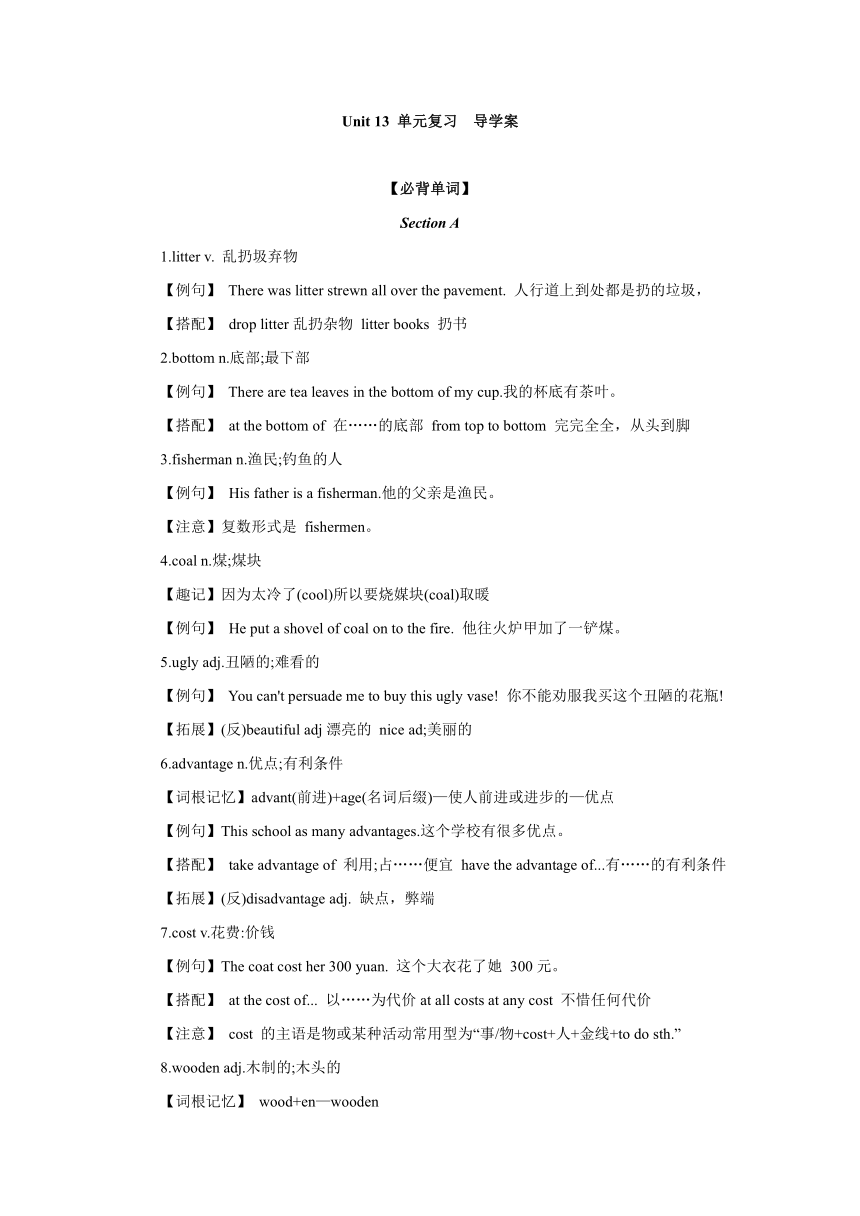 | |
| 格式 | docx | ||
| 文件大小 | 37.3KB | ||
| 资源类型 | 教案 | ||
| 版本资源 | 人教新目标(Go for it)版 | ||
| 科目 | 英语 | ||
| 更新时间 | 2024-06-03 06:38:35 | ||
图片预览

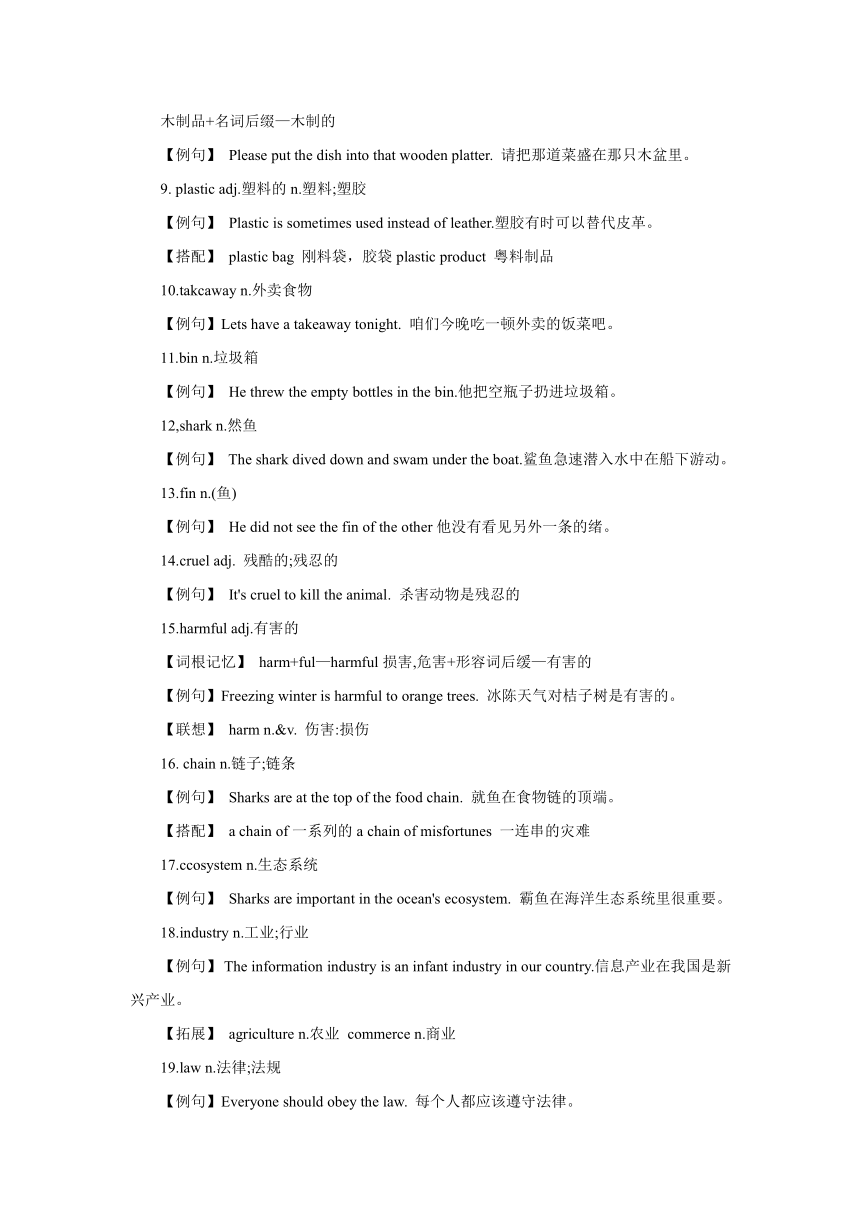
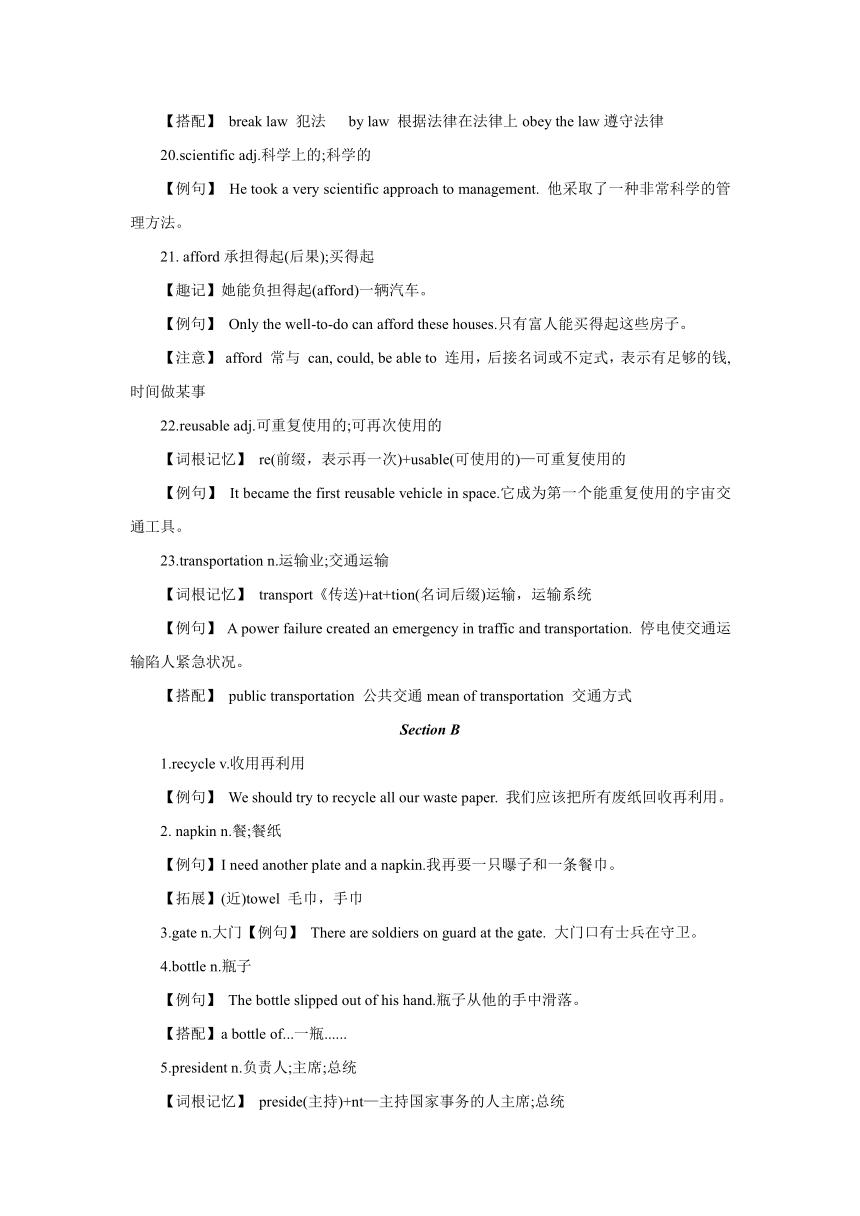
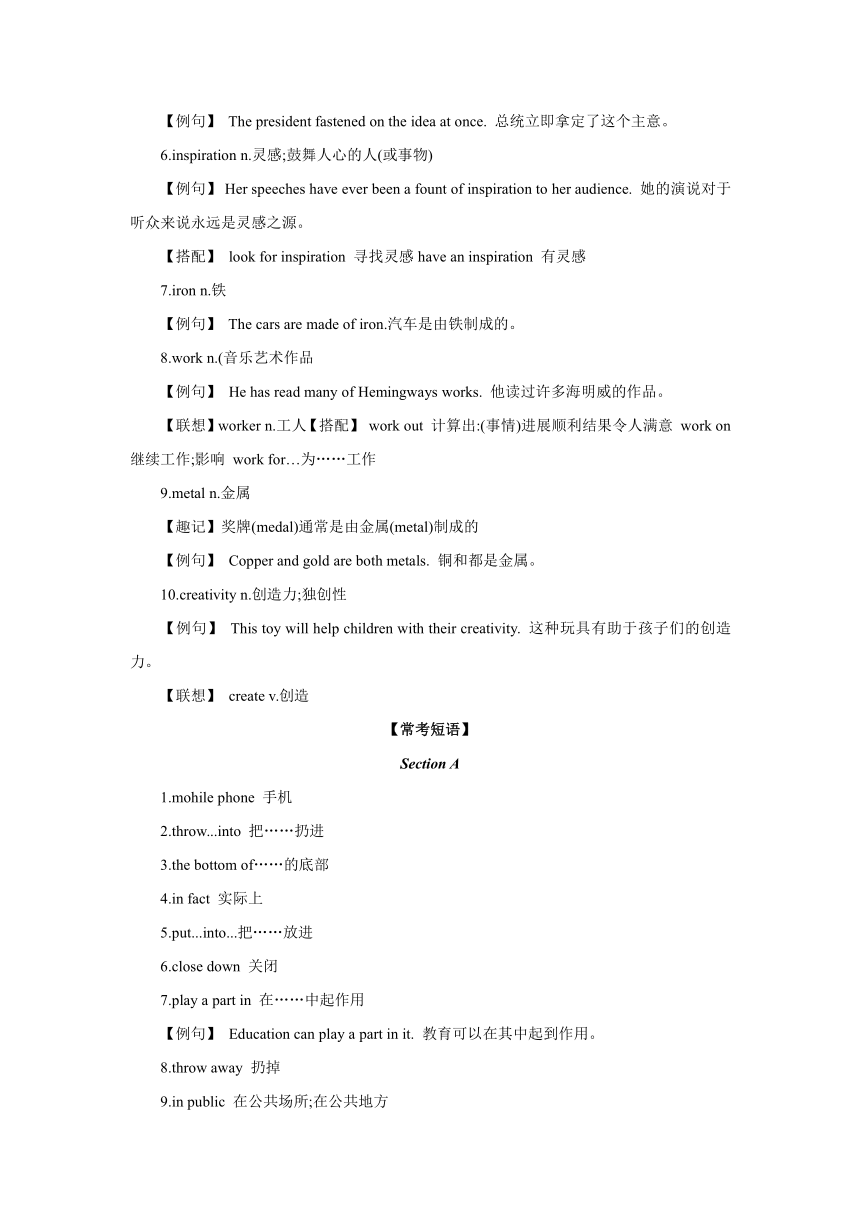
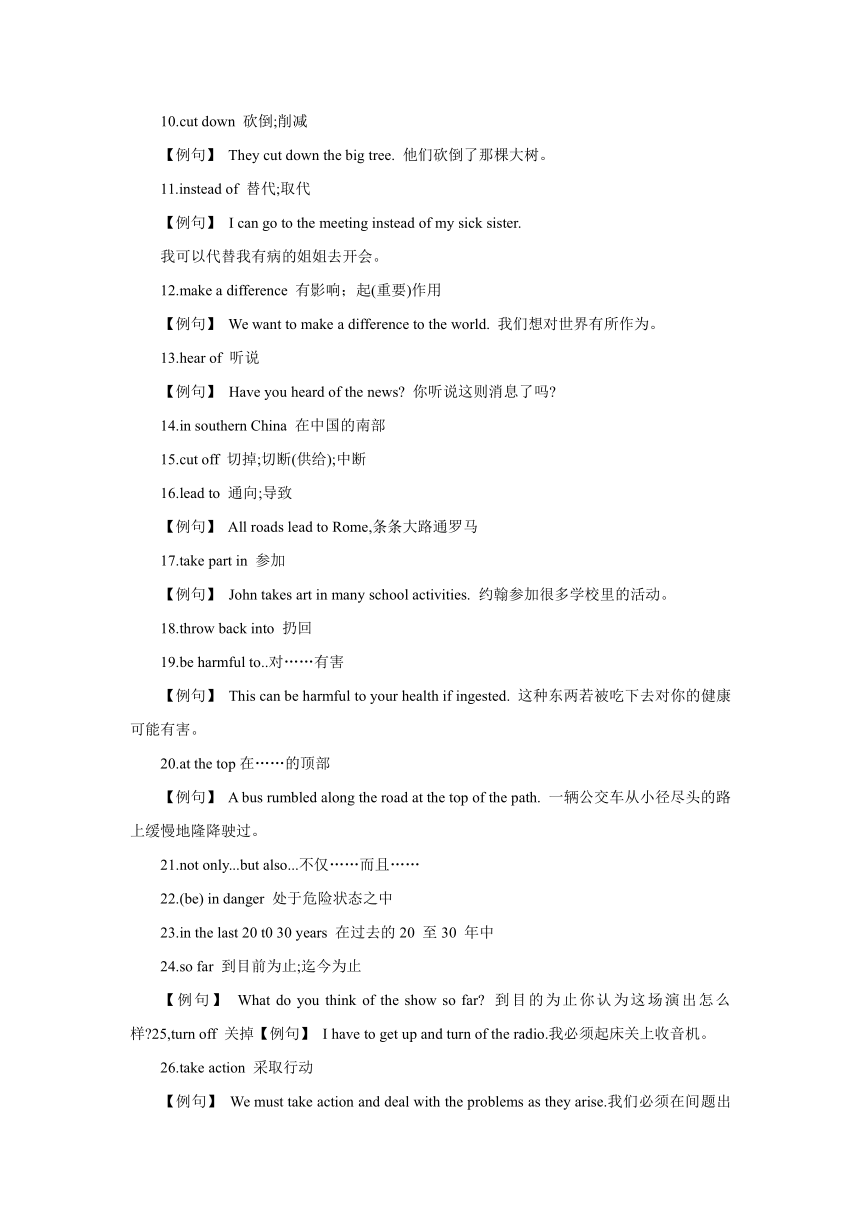
文档简介
Unit 13 单元复习 导学案
【必背单词】
Section A
1.litter v. 乱扔圾弃物
【例句】 There was litter strewn all over the pavement. 人行道上到处都是扔的垃圾,
【搭配】 drop litter乱扔杂物 litter books 扔书
2.bottom n.底部;最下部
【例句】 There are tea leaves in the bottom of my cup.我的杯底有茶叶。
【搭配】 at the bottom of 在……的底部 from top to bottom 完完全全,从头到脚
3.fisherman n.渔民;钓鱼的人
【例句】 His father is a fisherman.他的父亲是渔民。
【注意】复数形式是 fishermen。
4.coal n.煤;煤块
【趣记】因为太冷了(cool)所以要烧媒块(coal)取暖
【例句】 He put a shovel of coal on to the fire. 他往火炉甲加了一铲煤。
5.ugly adj.丑陋的;难看的
【例句】 You can't persuade me to buy this ugly vase! 你不能劝服我买这个丑陋的花瓶!
【拓展】(反)beautiful adj漂亮的 nice ad;美丽的
6.advantage n.优点;有利条件
【词根记忆】advant(前进)+age(名词后缀)—使人前进或进步的—优点
【例句】This school as many advantages.这个学校有很多优点。
【搭配】 take advantage of 利用;占……便宜 have the advantage of...有……的有利条件
【拓展】(反)disadvantage adj. 缺点,弊端
7.cost v.花费:价钱
【例句】The coat cost her 300 yuan. 这个大衣花了她 300元。
【搭配】 at the cost of... 以……为代价at all costs at any cost 不惜任何代价
【注意】 cost 的主语是物或某种活动常用型为“事/物+cost+人+金线+to do sth.”
8.wooden adj.木制的;木头的
【词根记忆】 wood+en—wooden
木制品+名词后缀—木制的
【例句】 Please put the dish into that wooden platter. 请把那道菜盛在那只木盆里。
9. plastic adj.塑料的n.塑料;塑胶
【例句】 Plastic is sometimes used instead of leather.塑胶有时可以替代皮革。
【搭配】 plastic bag 刚料袋,胶袋plastic product 粤料制品
10.takcaway n.外卖食物
【例句】Lets have a takeaway tonight. 咱们今晚吃一顿外卖的饭菜吧。
11.bin n.垃圾箱
【例句】 He threw the empty bottles in the bin.他把空瓶子扔进垃圾箱。
12,shark n.然鱼
【例句】 The shark dived down and swam under the boat.鲨鱼急速潜入水中在船下游动。
13.fin n.(鱼)
【例句】 He did not see the fin of the other他没有看见另外一条的绪。
14.cruel adj. 残酷的;残忍的
【例句】 It's cruel to kill the animal. 杀害动物是残忍的
15.harmful adj.有害的
【词根记忆】 harm+ful—harmful损害,危害+形容词后缓—有害的
【例句】Freezing winter is harmful to orange trees. 冰陈天气对桔子树是有害的。
【联想】 harm n.&v. 伤害:损伤
16. chain n.链子;链条
【例句】 Sharks are at the top of the food chain. 就鱼在食物链的顶端。
【搭配】 a chain of一系列的a chain of misfortunes 一连串的灾难
17.ccosystem n.生态系统
【例句】 Sharks are important in the ocean's ecosystem. 霸鱼在海洋生态系统里很重要。
18.industry n.工业;行业
【例句】 The information industry is an infant industry in our country.信息产业在我国是新兴产业。
【拓展】 agriculture n.农业 commerce n.商业
19.law n.法律;法规
【例句】Everyone should obey the law. 每个人都应该遵守法律。
【搭配】 break law 犯法 by law 根据法律在法律上obey the law遵守法律
20.scientific adj.科学上的;科学的
【例句】 He took a very scientific approach to management. 他采取了一种非常科学的管理方法。
21. afford承担得起(后果);买得起
【趣记】她能负担得起(afford)一辆汽车。
【例句】 Only the well-to-do can afford these houses.只有富人能买得起这些房子。
【注意】 afford 常与 can, could, be able to 连用,后接名词或不定式,表示有足够的钱,时间做某事
22.reusable adj.可重复使用的;可再次使用的
【词根记忆】 re(前缀,表示再一次)+usable(可使用的)—可重复使用的
【例句】 It became the first reusable vehicle in space.它成为第一个能重复使用的宇宙交通工具。
23.transportation n.运输业;交通运输
【词根记忆】 transport《传送)+at+tion(名词后缀)运输,运输系统
【例句】 A power failure created an emergency in traffic and transportation. 停电使交通运输陷人紧急状况。
【搭配】 public transportation 公共交通mean of transportation 交通方式
Section B
1.recycle v.收用再利用
【例句】 We should try to recycle all our waste paper. 我们应该把所有废纸回收再利用。
2. napkin n.餐;餐纸
【例句】I need another plate and a napkin.我再要一只曝子和一条餐巾。
【拓展】(近)towel 毛巾,手巾
3.gate n.大门【例句】 There are soldiers on guard at the gate. 大门口有士兵在守卫。
4.bottle n.瓶子
【例句】 The bottle slipped out of his hand.瓶子从他的手中滑落。
【搭配】a bottle of...一瓶......
5.president n.负责人;主席;总统
【词根记忆】 preside(主持)+nt—主持国家事务的人主席;总统
【例句】 The president fastened on the idea at once. 总统立即拿定了这个主意。
6.inspiration n.灵感;鼓舞人心的人(或事物)
【例句】 Her speeches have ever been a fount of inspiration to her audience. 她的演说对于听众来说永远是灵感之源。
【搭配】 look for inspiration 寻找灵感have an inspiration 有灵感
7.iron n.铁
【例句】 The cars are made of iron.汽车是由铁制成的。
8.work n.(音乐艺术作品
【例句】 He has read many of Hemingways works. 他读过许多海明威的作品。
【联想】worker n.工人【搭配】 work out 计算出:(事情)进展顺利结果令人满意 work on 继续工作;影响 work for…为……工作
9.metal n.金属
【趣记】奖牌(medal)通常是由金属(metal)制成的
【例句】 Copper and gold are both metals. 铜和都是金属。
10.creativity n.创造力;独创性
【例句】 This toy will help children with their creativity. 这种玩具有助于孩子们的创造力。
【联想】 create v.创造
【常考短语】
Section A
1.mohile phone 手机
2.throw...into 把……扔进
3.the bottom of……的底部
4.in fact 实际上
5.put...into...把……放进
6.close down 关闭
7.play a part in 在……中起作用
【例句】 Education can play a part in it. 教育可以在其中起到作用。
8.throw away 扔掉
9.in public 在公共场所;在公共地方
10.cut down 砍倒;削减
【例句】 They cut down the big tree. 他们砍倒了那棵大树。
11.instead of 替代;取代
【例句】 I can go to the meeting instead of my sick sister.
我可以代替我有病的姐姐去开会。
12.make a difference 有影响;起(重要)作用
【例句】 We want to make a difference to the world. 我们想对世界有所作为。
13.hear of 听说
【例句】 Have you heard of the news 你听说这则消息了吗
14.in southern China 在中国的南部
15.cut off 切掉;切断(供给);中断
16.lead to 通向;导致
【例句】 All roads lead to Rome,条条大路通罗马
17.take part in 参加
【例句】 John takes art in many school activities. 约翰参加很多学校里的活动。
18.throw back into 扔回
19.be harmful to..对……有害
【例句】 This can be harmful to your health if ingested. 这种东两若被吃下去对你的健康可能有害。
20.at the top在……的顶部
【例句】 A bus rumbled along the road at the top of the path. 一辆公交车从小径尽头的路上缓慢地隆降驶过。
21.not only...but also...不仅……而且……
22.(be) in danger 处于危险状态之中
23.in the last 20 t0 30 years 在过去的20 至30 年中
24.so far 到目前为止;迄今为止
【例句】 What do you think of the show so far 到目的为止你认为这场演出怎么样 25,turn off 关掉【例句】 I have to get up and turn of the radio.我必须起床关上收音机。
26.take action 采取行动
【例句】 We must take action and deal with the problems as they arise.我们必须在间题出现的时候及时采取行动。
27.be against(doing)反对做……
28.help out 帮……解决困难
29.pay for 付款;付出代价
【例句】 How much did you pay for the book 那本书你付了多少钱
30.add up 把……加起来;加起来
【例句】 Please add up these numbers. 请把这些数字加起来。
31. go shopping 去购物
【例句】 I like going shopping.我喜欢购物。
32.begin with 以……开始
【例句】 Lesson 1 begins with a song. 第 1 节课以一首歌开始。
33.be good for 对……有益
【例句】 Milk s good for our health. 牛奶对我们的健康有益。
Section B
1. put sth. to good use 好好利用
【例句】 We should put weekends to good use. 我们应该好好利用周末。
2.think about 考虑
3.be made of/from 由……制造成
4.build sth. out of 用……来建造某物
5.upside down 上下颠倒,倒转
【例句】 His eyes were open and everything he saw was upside down.他的眼睛睁开了,看到的一切都是颠倒的。
6.pull...down 拆下;摧毁
【例句】 It is easier to pull down than to build up.拆房容易益房难。
7.win a prize 获奖
8.be an inspiration to sb,成为……的榜样
9.set up 建立
【例句】 We set up a company. 我们成立了一个公司。
10.art pieces 艺术品
11. be known/famous for 因……而出名
12.the importance of ......的重要性
13.a small/large number of 少量/很多
14.an online business 网上生意网店
15.get worse and worse 变得越来越严重
16.with a little creativity 用一点创造力
17.bring back恢复;使想起;带回
【例】 Your article brought back sad memories for me.
你的文章使我想起了伤心的往事。
18. look like 看起来像
【例句】 Her face looks like a red apple. 她的脸看上去像个红苹果。
19. in front of
【例句】 There is a tree in front of the classroom.教前面有一棵树。
20.he good at 擅长;在……方面做得好
【例句】 He is good at English.他长英语。
【重点句型】
Section A
I think it's a great idea that you now have to pay for plastic bags in some stores. 在一些商店里你现在不得不为塑料袋付款,我认为这是一个好主意。
“It's a great idea+hat 从句”意为”……是一个好主意”,其结构为:It+be+名词《词组)+that 从句it 在中作形式主语,真正的主语是 that 引导的从句。
【例句】 It's a great idea that we take turns at cooking. 我们轮流下厨是一个好主意。
Section B
1. She lives in a house in the UK that she built herself out of rubbish. 她住在英国,房子是她自己用废弃物建造而成的。此处 that引导定语从句.修饰前面的名词 house.关系代词that 在定语从句中作宾语。
2. The top of the house is an old boat turned upside down. 房子的顶部是一条翻转过来的旧木船。句中过去分词短语 turned upside down 作后置定语,修饰名词 boat
3. Amy isn't the only one who is good at recycling. 艾米并不是唯一一个擅长废物利用的人。关系代词 who 在句中引导定语从创,修饰先行词 the only one,且 who 在定语从句中作主语。【例句】 The student who is answering the question is John.正在回答间题的那个学生是约翰。
【拓展】 在定语从句中,先行词指人,且关系代词在从句中作宽语时,美系代词可用 who 或 whom。
【例句】 Do you know Mr. Zhang who/whom they like very much 你认识他们非常喜欢的张先生吗
4. She opened a small shop where she sells her bags, and she has also set up a website to sell them online. 她开了一家小店来出售她的包,她还建立了一个网站,在网上销售它们。
句中 and 连接两个并列句。在前一个分句中又含有一个where引导的定语从句,修饰先行词 shop。关系副词where 在从句中作地点状语。
【例句】 This is the place where we lived for three years. 这就是我们曾经住过3年的地方。
【语法总结】
一、现在进行时
1.现在进行时的构成
助动词be(am/is/are)+动词-ing 形式
2.现在进行时的用法:
表示现在正在进行或发生的动作,也表示现阶段或当前一段时间内正在进行的动作,常见的标志词或时间状诺有 now,look,listen,these days 等。
They are playing basketball now现在他们正在打篮球。
Listen! She is singing an English song.听! 她正在唱英语歌。
We are making model planes these days,这些天我们在做飞机模型。
Look! The children are flying kites in the park.看!孩子们正在公园放风筝。
3.现在进行时的句式结构:
句式 结构 例句
肯定句 主语+be(am/is/are)+动词-ing 形式+其他。 She is singing in he room. 她正在房间里唱歌。
否定句 主语+be(am/is/are)+not +动词-ing 形式+其他。 She isn't singing in the room. 她没在房间里唱歌。
一般疑问句 Be(Am/Is/Are)+主语+动-ing 形式+其他 Is she singing in the room 她正在房间唱歌吗?
肯定间答:Yes,主语+be(am/is/are). Yes, she is.是的,她在唱
否定回答:No, 主语+am not/isn't/aren't. No, she isn’t.不,她没有。
特殊疑问句 疑问词+be(am/is/are)+主语+动词-ing 形式+其他 What is she doing in the room 她正在房间里做什么
4.动词现在分词(-ing 形式)的构成:
类别 构成方法 例词
一般情况 在词尾加-ing visit-visiting play-playing
以不发音的字母 e 结尾的动词 去掉e, 再加-ing make-making come-coming
以重读闭音节结尾、末尾只有一个输音字母的动词 先双写辅音字母,再加-ing get-getting swim-swimming
二、used to的用法
“used to+动词原形”表示过去存在某种状态或者过去经常性,习惯性的动作,并意味着这种状态或动作目前已不存在。used to 的句式结构:
句式 结构 例句
肯定句 主语+used to+动词原形+其他. He used to play basketball after school.他过去常常放学后打篮球。
否定句 “主语+didn't use to+动词原形+其他.”或 “主语+usedn't to+动词原形+其他” She didn't use to have long hair. She usedn't to have long hair. 她以前没留长发。
一般疑问句 “Did+主语+use to+动词原形+其他 ”或 “Used+主语+to+动词原形+其他 ” Did you use to play the piano = Used you to play the piano 你过去经常弹钢琴吗
三、现在完成时
现在完成时的结构为“have/has+动词的过去分词”
1.现在完成时的句式结构:
(1)肯定句;主语+have/has+动词的过去分词+其他
(2)否定创:主语+haven’t/hasn’t +动词的过去分词+其他
(3)一般疑问句:Have/Has+丰语+动词的过去分词+其他
简略答语:Yes.主语+have/has.(肯定)
No, 主语+haven't/hasn't.(否定)
2.动词过去分词的变化规则:规则动词的过去分词的构成规则与其过去式的构成规则相同:
(1)一般动词,在词尾直接加 -ed.
work-worked-worked. visit-visited-visited
(2)以不发音的字母e结尾的动词,只在词尾加 -d
live-lived-lived
(3)以“辅音字母+y”结尾的动词,将y变为i.再加 -ed
study-studied-studied, cry-cried-cried
(4)以重读闭音节结尾、末尾只有一个辅音字母的动词,先双写该辅音字,再加 -ed.
stop-stopped-stopped. drop-dropped-dropped
四、被动语态
1.动词的语态表示主语与谓语之间的关系。英语中的语态分为主动语态与被动语态两种主动语态表示主语为谓语动词动作的执行者;被动语态表示主语为谓语动词动作的承受者。被动语态的基本构成为“be+及物动词的过去分词”时态通过 be 的变化来体现。几种常用时态的被动语态的结构如下:
时态 被动语态的结构 例句
一般现在时 am/is/are+及物动词的过去分词 The book is liked by teenagers. 青少年喜欢这本书。
一般过去式 was/were+及物动词的过去分 The boy was saved. 这个男孩被救了
一般将来时 will/shall be+及物动词的过去分词 He will be sent to his hometown by his parents next year. 明年他的父丹将送他回家乡。
现在进行时 am/is are+being+及物动词的过去分词 The road is being repaired. 这条马路正在修缮中。
现在完成时 have/has been+及物动词的过去分词 The task has been finished by the workers. 任务已被工人们完成了。
【注意】含有情态动词的被动语态由“情态动词+be+及物动词的过去分词”构成。Teenagers should be allowed to make their own decisions.应该允许青少年自己做决定。
2.被动语态主要在下面几种情况中使用:
(1)不知道或没有必要说明动作的执行者是谁(这时不带由 by 引起的短语)These books are written for children.这些书是为儿童写的。
(2)需要强调或突出动作的承受者(这时可带由 by 引起的短语)
The book was written by Lu Xun这本书是由鲁迅写的。
Man-made satellites have been sent up into space by many countries. 许多国家已向太空发射了人造卫星。
(3)出于礼貌等方面的考虑不愿说出动作的执行者。
He was asked to give a talk about how to learn English well. 他被要求做关于怎样学好英语的报告。
【助记】被动语态的用法;谁的动作不知道,说出谁做没必要;承受之人需强调被动语态莫忘了。
The car was stolen yesterday.汽车昨天被盗了。
Football is played in most middle schools.在大多数中学里都踢足球
3.主动语态变为被动语态的方法:
①将主动语态的宾语变为被动语态的主语;
②将主动语态的谓语变为”be+及物动词的过去分词”形式;
③将主动语态的主语变成介词 by 的宾语(有时可省略)放在谓语之后。
4.被动诺态的注意事项:
(1)“主语+连系动词+表诺"的句子没有被动语态
(2)there be结构没有被动语态
(3)主动句中宾语是反身代词的没有被动语态。
(4)句子是主谓结构时,没有被动语态。也就是说,不及物动词没有被动语态。
(5)有些不及物动词加介词构成及物动词知语,如果变被动语态,注意不能把动词后的介词丢掉。He looks after his sister.— His sister is looked after by him. 他照看他妹妹。
(6)主动语态中,在 make,let,hear,see,watch,notice 等词后跟省 to 的动词不定式但在被动语态中to 不可省略。
We saw a stranger enter the hall. —A stranger was seen to enter the hall. 我们看个陌生人进人了大厅。
五、情态动词
情态动词表示说话人对所述动作或状态的态度或看法。它不能单独作谓语,必须和后面的动词原形一起构成谓语,一般没有人称和数的变化。常用的情态动词(词组)有 can, could,may,might,have to,must,should,would 等,用法如下:
情态动词 用法 意义 例句
can/could 表示能力此时could 为 can 的过去式 能;会 Tom can speak Russian.汤姆会说俄语。
表示请求,许可,此时 could 不是 can 的过去式,只是表示语气更委婉,客气 可以 I couldn't swim at the age of sev-en.7 岁时我不会游泳。
can 表示推测,常用于否定句或疑问句地 可能 Can/Could I watch Ty for awhile 我可以看一会儿电视吗 You can take this seat.你可以坐这个位子。 Jim can't be at homme吉姆不可能在家里。How can that be true 那怎么可能是真的呢
may/might 用于肯定句中,表示允许 可以 You may go home. 你可以回家了。 He said I might use his bike. 他说我可以用他的自行车。
用于疑问句中表示请求,用might语气更委婉 可以 May I go now 我现在可以走了吗
表示推测,只用于肯定句中 可能;也许 She may/might come tomorrow. 她可能明天来。
have to/must 表示义务或责任have to 强调客观需要;而must强调主观看法 必须 Because he had no money, he had to walk home. 因为没有钱,他不得不步行回家。 You must do it at once. 你必须马上做。
must 表示推测,只用在肯定句中 一定;必须;背定 You must be tired after the long journey.长途旅行之后,你一定累了。
should 表示劝告、建议、命令等 应该 You should drink lots of water. 你应该喝大量的水。
would 表示请求、意愿、倾向等 愿意:将要 She would have a try. 她愿意试一试。
【活学活用】
1. —Hurry up! Jack _______for you to play basketball.
—OK. I'm coming.
A. waited B. is waiting C. was waiting
2. —Steve, let's go to the movie.
—I'm afraid I can't, I ________the World Table Tennis Championships(锦标赛).
A. watch B. am watching C. watched
3. Sam used to _______games for fun, but now he wants to do_______.
A. play; something else B. playing; something else
C play; else something D. playing; else something
4. —Look! Your teacher Miss White is over there.
—No, it can't be her. She _______to Beijing.
A. has gone B. has been C. went D. will go
5. Let's wait and see whether books _______by the Internet in the future.
A. replace B. replaced
C. will be replaced D. were replaced
6. —Why are you leaving your job
—I can't stand it any longer. I ________always _______to work overtime.
A. am; asking B. am; asked
C. was; asking D was; asked
7. —Mr. Wang,I didn1see you this morning. Where did you go
—Oh. I ______to give a speech.
A. invited B. will invite C. was invited
8. —The tall man with glasses over there looks like our math teacher.
—It _______be him. He has gone abroad.
A. may not B. mustn't C. can't D. needn’t
9. —David,turn off your computer now! You ________play on it too long.
—I see,Mum.
A. couldn't B. musen’t C. wouldn't
【必背单词】
Section A
1.litter v. 乱扔圾弃物
【例句】 There was litter strewn all over the pavement. 人行道上到处都是扔的垃圾,
【搭配】 drop litter乱扔杂物 litter books 扔书
2.bottom n.底部;最下部
【例句】 There are tea leaves in the bottom of my cup.我的杯底有茶叶。
【搭配】 at the bottom of 在……的底部 from top to bottom 完完全全,从头到脚
3.fisherman n.渔民;钓鱼的人
【例句】 His father is a fisherman.他的父亲是渔民。
【注意】复数形式是 fishermen。
4.coal n.煤;煤块
【趣记】因为太冷了(cool)所以要烧媒块(coal)取暖
【例句】 He put a shovel of coal on to the fire. 他往火炉甲加了一铲煤。
5.ugly adj.丑陋的;难看的
【例句】 You can't persuade me to buy this ugly vase! 你不能劝服我买这个丑陋的花瓶!
【拓展】(反)beautiful adj漂亮的 nice ad;美丽的
6.advantage n.优点;有利条件
【词根记忆】advant(前进)+age(名词后缀)—使人前进或进步的—优点
【例句】This school as many advantages.这个学校有很多优点。
【搭配】 take advantage of 利用;占……便宜 have the advantage of...有……的有利条件
【拓展】(反)disadvantage adj. 缺点,弊端
7.cost v.花费:价钱
【例句】The coat cost her 300 yuan. 这个大衣花了她 300元。
【搭配】 at the cost of... 以……为代价at all costs at any cost 不惜任何代价
【注意】 cost 的主语是物或某种活动常用型为“事/物+cost+人+金线+to do sth.”
8.wooden adj.木制的;木头的
【词根记忆】 wood+en—wooden
木制品+名词后缀—木制的
【例句】 Please put the dish into that wooden platter. 请把那道菜盛在那只木盆里。
9. plastic adj.塑料的n.塑料;塑胶
【例句】 Plastic is sometimes used instead of leather.塑胶有时可以替代皮革。
【搭配】 plastic bag 刚料袋,胶袋plastic product 粤料制品
10.takcaway n.外卖食物
【例句】Lets have a takeaway tonight. 咱们今晚吃一顿外卖的饭菜吧。
11.bin n.垃圾箱
【例句】 He threw the empty bottles in the bin.他把空瓶子扔进垃圾箱。
12,shark n.然鱼
【例句】 The shark dived down and swam under the boat.鲨鱼急速潜入水中在船下游动。
13.fin n.(鱼)
【例句】 He did not see the fin of the other他没有看见另外一条的绪。
14.cruel adj. 残酷的;残忍的
【例句】 It's cruel to kill the animal. 杀害动物是残忍的
15.harmful adj.有害的
【词根记忆】 harm+ful—harmful损害,危害+形容词后缓—有害的
【例句】Freezing winter is harmful to orange trees. 冰陈天气对桔子树是有害的。
【联想】 harm n.&v. 伤害:损伤
16. chain n.链子;链条
【例句】 Sharks are at the top of the food chain. 就鱼在食物链的顶端。
【搭配】 a chain of一系列的a chain of misfortunes 一连串的灾难
17.ccosystem n.生态系统
【例句】 Sharks are important in the ocean's ecosystem. 霸鱼在海洋生态系统里很重要。
18.industry n.工业;行业
【例句】 The information industry is an infant industry in our country.信息产业在我国是新兴产业。
【拓展】 agriculture n.农业 commerce n.商业
19.law n.法律;法规
【例句】Everyone should obey the law. 每个人都应该遵守法律。
【搭配】 break law 犯法 by law 根据法律在法律上obey the law遵守法律
20.scientific adj.科学上的;科学的
【例句】 He took a very scientific approach to management. 他采取了一种非常科学的管理方法。
21. afford承担得起(后果);买得起
【趣记】她能负担得起(afford)一辆汽车。
【例句】 Only the well-to-do can afford these houses.只有富人能买得起这些房子。
【注意】 afford 常与 can, could, be able to 连用,后接名词或不定式,表示有足够的钱,时间做某事
22.reusable adj.可重复使用的;可再次使用的
【词根记忆】 re(前缀,表示再一次)+usable(可使用的)—可重复使用的
【例句】 It became the first reusable vehicle in space.它成为第一个能重复使用的宇宙交通工具。
23.transportation n.运输业;交通运输
【词根记忆】 transport《传送)+at+tion(名词后缀)运输,运输系统
【例句】 A power failure created an emergency in traffic and transportation. 停电使交通运输陷人紧急状况。
【搭配】 public transportation 公共交通mean of transportation 交通方式
Section B
1.recycle v.收用再利用
【例句】 We should try to recycle all our waste paper. 我们应该把所有废纸回收再利用。
2. napkin n.餐;餐纸
【例句】I need another plate and a napkin.我再要一只曝子和一条餐巾。
【拓展】(近)towel 毛巾,手巾
3.gate n.大门【例句】 There are soldiers on guard at the gate. 大门口有士兵在守卫。
4.bottle n.瓶子
【例句】 The bottle slipped out of his hand.瓶子从他的手中滑落。
【搭配】a bottle of...一瓶......
5.president n.负责人;主席;总统
【词根记忆】 preside(主持)+nt—主持国家事务的人主席;总统
【例句】 The president fastened on the idea at once. 总统立即拿定了这个主意。
6.inspiration n.灵感;鼓舞人心的人(或事物)
【例句】 Her speeches have ever been a fount of inspiration to her audience. 她的演说对于听众来说永远是灵感之源。
【搭配】 look for inspiration 寻找灵感have an inspiration 有灵感
7.iron n.铁
【例句】 The cars are made of iron.汽车是由铁制成的。
8.work n.(音乐艺术作品
【例句】 He has read many of Hemingways works. 他读过许多海明威的作品。
【联想】worker n.工人【搭配】 work out 计算出:(事情)进展顺利结果令人满意 work on 继续工作;影响 work for…为……工作
9.metal n.金属
【趣记】奖牌(medal)通常是由金属(metal)制成的
【例句】 Copper and gold are both metals. 铜和都是金属。
10.creativity n.创造力;独创性
【例句】 This toy will help children with their creativity. 这种玩具有助于孩子们的创造力。
【联想】 create v.创造
【常考短语】
Section A
1.mohile phone 手机
2.throw...into 把……扔进
3.the bottom of……的底部
4.in fact 实际上
5.put...into...把……放进
6.close down 关闭
7.play a part in 在……中起作用
【例句】 Education can play a part in it. 教育可以在其中起到作用。
8.throw away 扔掉
9.in public 在公共场所;在公共地方
10.cut down 砍倒;削减
【例句】 They cut down the big tree. 他们砍倒了那棵大树。
11.instead of 替代;取代
【例句】 I can go to the meeting instead of my sick sister.
我可以代替我有病的姐姐去开会。
12.make a difference 有影响;起(重要)作用
【例句】 We want to make a difference to the world. 我们想对世界有所作为。
13.hear of 听说
【例句】 Have you heard of the news 你听说这则消息了吗
14.in southern China 在中国的南部
15.cut off 切掉;切断(供给);中断
16.lead to 通向;导致
【例句】 All roads lead to Rome,条条大路通罗马
17.take part in 参加
【例句】 John takes art in many school activities. 约翰参加很多学校里的活动。
18.throw back into 扔回
19.be harmful to..对……有害
【例句】 This can be harmful to your health if ingested. 这种东两若被吃下去对你的健康可能有害。
20.at the top在……的顶部
【例句】 A bus rumbled along the road at the top of the path. 一辆公交车从小径尽头的路上缓慢地隆降驶过。
21.not only...but also...不仅……而且……
22.(be) in danger 处于危险状态之中
23.in the last 20 t0 30 years 在过去的20 至30 年中
24.so far 到目前为止;迄今为止
【例句】 What do you think of the show so far 到目的为止你认为这场演出怎么样 25,turn off 关掉【例句】 I have to get up and turn of the radio.我必须起床关上收音机。
26.take action 采取行动
【例句】 We must take action and deal with the problems as they arise.我们必须在间题出现的时候及时采取行动。
27.be against(doing)反对做……
28.help out 帮……解决困难
29.pay for 付款;付出代价
【例句】 How much did you pay for the book 那本书你付了多少钱
30.add up 把……加起来;加起来
【例句】 Please add up these numbers. 请把这些数字加起来。
31. go shopping 去购物
【例句】 I like going shopping.我喜欢购物。
32.begin with 以……开始
【例句】 Lesson 1 begins with a song. 第 1 节课以一首歌开始。
33.be good for 对……有益
【例句】 Milk s good for our health. 牛奶对我们的健康有益。
Section B
1. put sth. to good use 好好利用
【例句】 We should put weekends to good use. 我们应该好好利用周末。
2.think about 考虑
3.be made of/from 由……制造成
4.build sth. out of 用……来建造某物
5.upside down 上下颠倒,倒转
【例句】 His eyes were open and everything he saw was upside down.他的眼睛睁开了,看到的一切都是颠倒的。
6.pull...down 拆下;摧毁
【例句】 It is easier to pull down than to build up.拆房容易益房难。
7.win a prize 获奖
8.be an inspiration to sb,成为……的榜样
9.set up 建立
【例句】 We set up a company. 我们成立了一个公司。
10.art pieces 艺术品
11. be known/famous for 因……而出名
12.the importance of ......的重要性
13.a small/large number of 少量/很多
14.an online business 网上生意网店
15.get worse and worse 变得越来越严重
16.with a little creativity 用一点创造力
17.bring back恢复;使想起;带回
【例】 Your article brought back sad memories for me.
你的文章使我想起了伤心的往事。
18. look like 看起来像
【例句】 Her face looks like a red apple. 她的脸看上去像个红苹果。
19. in front of
【例句】 There is a tree in front of the classroom.教前面有一棵树。
20.he good at 擅长;在……方面做得好
【例句】 He is good at English.他长英语。
【重点句型】
Section A
I think it's a great idea that you now have to pay for plastic bags in some stores. 在一些商店里你现在不得不为塑料袋付款,我认为这是一个好主意。
“It's a great idea+hat 从句”意为”……是一个好主意”,其结构为:It+be+名词《词组)+that 从句it 在中作形式主语,真正的主语是 that 引导的从句。
【例句】 It's a great idea that we take turns at cooking. 我们轮流下厨是一个好主意。
Section B
1. She lives in a house in the UK that she built herself out of rubbish. 她住在英国,房子是她自己用废弃物建造而成的。此处 that引导定语从句.修饰前面的名词 house.关系代词that 在定语从句中作宾语。
2. The top of the house is an old boat turned upside down. 房子的顶部是一条翻转过来的旧木船。句中过去分词短语 turned upside down 作后置定语,修饰名词 boat
3. Amy isn't the only one who is good at recycling. 艾米并不是唯一一个擅长废物利用的人。关系代词 who 在句中引导定语从创,修饰先行词 the only one,且 who 在定语从句中作主语。【例句】 The student who is answering the question is John.正在回答间题的那个学生是约翰。
【拓展】 在定语从句中,先行词指人,且关系代词在从句中作宽语时,美系代词可用 who 或 whom。
【例句】 Do you know Mr. Zhang who/whom they like very much 你认识他们非常喜欢的张先生吗
4. She opened a small shop where she sells her bags, and she has also set up a website to sell them online. 她开了一家小店来出售她的包,她还建立了一个网站,在网上销售它们。
句中 and 连接两个并列句。在前一个分句中又含有一个where引导的定语从句,修饰先行词 shop。关系副词where 在从句中作地点状语。
【例句】 This is the place where we lived for three years. 这就是我们曾经住过3年的地方。
【语法总结】
一、现在进行时
1.现在进行时的构成
助动词be(am/is/are)+动词-ing 形式
2.现在进行时的用法:
表示现在正在进行或发生的动作,也表示现阶段或当前一段时间内正在进行的动作,常见的标志词或时间状诺有 now,look,listen,these days 等。
They are playing basketball now现在他们正在打篮球。
Listen! She is singing an English song.听! 她正在唱英语歌。
We are making model planes these days,这些天我们在做飞机模型。
Look! The children are flying kites in the park.看!孩子们正在公园放风筝。
3.现在进行时的句式结构:
句式 结构 例句
肯定句 主语+be(am/is/are)+动词-ing 形式+其他。 She is singing in he room. 她正在房间里唱歌。
否定句 主语+be(am/is/are)+not +动词-ing 形式+其他。 She isn't singing in the room. 她没在房间里唱歌。
一般疑问句 Be(Am/Is/Are)+主语+动-ing 形式+其他 Is she singing in the room 她正在房间唱歌吗?
肯定间答:Yes,主语+be(am/is/are). Yes, she is.是的,她在唱
否定回答:No, 主语+am not/isn't/aren't. No, she isn’t.不,她没有。
特殊疑问句 疑问词+be(am/is/are)+主语+动词-ing 形式+其他 What is she doing in the room 她正在房间里做什么
4.动词现在分词(-ing 形式)的构成:
类别 构成方法 例词
一般情况 在词尾加-ing visit-visiting play-playing
以不发音的字母 e 结尾的动词 去掉e, 再加-ing make-making come-coming
以重读闭音节结尾、末尾只有一个输音字母的动词 先双写辅音字母,再加-ing get-getting swim-swimming
二、used to的用法
“used to+动词原形”表示过去存在某种状态或者过去经常性,习惯性的动作,并意味着这种状态或动作目前已不存在。used to 的句式结构:
句式 结构 例句
肯定句 主语+used to+动词原形+其他. He used to play basketball after school.他过去常常放学后打篮球。
否定句 “主语+didn't use to+动词原形+其他.”或 “主语+usedn't to+动词原形+其他” She didn't use to have long hair. She usedn't to have long hair. 她以前没留长发。
一般疑问句 “Did+主语+use to+动词原形+其他 ”或 “Used+主语+to+动词原形+其他 ” Did you use to play the piano = Used you to play the piano 你过去经常弹钢琴吗
三、现在完成时
现在完成时的结构为“have/has+动词的过去分词”
1.现在完成时的句式结构:
(1)肯定句;主语+have/has+动词的过去分词+其他
(2)否定创:主语+haven’t/hasn’t +动词的过去分词+其他
(3)一般疑问句:Have/Has+丰语+动词的过去分词+其他
简略答语:Yes.主语+have/has.(肯定)
No, 主语+haven't/hasn't.(否定)
2.动词过去分词的变化规则:规则动词的过去分词的构成规则与其过去式的构成规则相同:
(1)一般动词,在词尾直接加 -ed.
work-worked-worked. visit-visited-visited
(2)以不发音的字母e结尾的动词,只在词尾加 -d
live-lived-lived
(3)以“辅音字母+y”结尾的动词,将y变为i.再加 -ed
study-studied-studied, cry-cried-cried
(4)以重读闭音节结尾、末尾只有一个辅音字母的动词,先双写该辅音字,再加 -ed.
stop-stopped-stopped. drop-dropped-dropped
四、被动语态
1.动词的语态表示主语与谓语之间的关系。英语中的语态分为主动语态与被动语态两种主动语态表示主语为谓语动词动作的执行者;被动语态表示主语为谓语动词动作的承受者。被动语态的基本构成为“be+及物动词的过去分词”时态通过 be 的变化来体现。几种常用时态的被动语态的结构如下:
时态 被动语态的结构 例句
一般现在时 am/is/are+及物动词的过去分词 The book is liked by teenagers. 青少年喜欢这本书。
一般过去式 was/were+及物动词的过去分 The boy was saved. 这个男孩被救了
一般将来时 will/shall be+及物动词的过去分词 He will be sent to his hometown by his parents next year. 明年他的父丹将送他回家乡。
现在进行时 am/is are+being+及物动词的过去分词 The road is being repaired. 这条马路正在修缮中。
现在完成时 have/has been+及物动词的过去分词 The task has been finished by the workers. 任务已被工人们完成了。
【注意】含有情态动词的被动语态由“情态动词+be+及物动词的过去分词”构成。Teenagers should be allowed to make their own decisions.应该允许青少年自己做决定。
2.被动语态主要在下面几种情况中使用:
(1)不知道或没有必要说明动作的执行者是谁(这时不带由 by 引起的短语)These books are written for children.这些书是为儿童写的。
(2)需要强调或突出动作的承受者(这时可带由 by 引起的短语)
The book was written by Lu Xun这本书是由鲁迅写的。
Man-made satellites have been sent up into space by many countries. 许多国家已向太空发射了人造卫星。
(3)出于礼貌等方面的考虑不愿说出动作的执行者。
He was asked to give a talk about how to learn English well. 他被要求做关于怎样学好英语的报告。
【助记】被动语态的用法;谁的动作不知道,说出谁做没必要;承受之人需强调被动语态莫忘了。
The car was stolen yesterday.汽车昨天被盗了。
Football is played in most middle schools.在大多数中学里都踢足球
3.主动语态变为被动语态的方法:
①将主动语态的宾语变为被动语态的主语;
②将主动语态的谓语变为”be+及物动词的过去分词”形式;
③将主动语态的主语变成介词 by 的宾语(有时可省略)放在谓语之后。
4.被动诺态的注意事项:
(1)“主语+连系动词+表诺"的句子没有被动语态
(2)there be结构没有被动语态
(3)主动句中宾语是反身代词的没有被动语态。
(4)句子是主谓结构时,没有被动语态。也就是说,不及物动词没有被动语态。
(5)有些不及物动词加介词构成及物动词知语,如果变被动语态,注意不能把动词后的介词丢掉。He looks after his sister.— His sister is looked after by him. 他照看他妹妹。
(6)主动语态中,在 make,let,hear,see,watch,notice 等词后跟省 to 的动词不定式但在被动语态中to 不可省略。
We saw a stranger enter the hall. —A stranger was seen to enter the hall. 我们看个陌生人进人了大厅。
五、情态动词
情态动词表示说话人对所述动作或状态的态度或看法。它不能单独作谓语,必须和后面的动词原形一起构成谓语,一般没有人称和数的变化。常用的情态动词(词组)有 can, could,may,might,have to,must,should,would 等,用法如下:
情态动词 用法 意义 例句
can/could 表示能力此时could 为 can 的过去式 能;会 Tom can speak Russian.汤姆会说俄语。
表示请求,许可,此时 could 不是 can 的过去式,只是表示语气更委婉,客气 可以 I couldn't swim at the age of sev-en.7 岁时我不会游泳。
can 表示推测,常用于否定句或疑问句地 可能 Can/Could I watch Ty for awhile 我可以看一会儿电视吗 You can take this seat.你可以坐这个位子。 Jim can't be at homme吉姆不可能在家里。How can that be true 那怎么可能是真的呢
may/might 用于肯定句中,表示允许 可以 You may go home. 你可以回家了。 He said I might use his bike. 他说我可以用他的自行车。
用于疑问句中表示请求,用might语气更委婉 可以 May I go now 我现在可以走了吗
表示推测,只用于肯定句中 可能;也许 She may/might come tomorrow. 她可能明天来。
have to/must 表示义务或责任have to 强调客观需要;而must强调主观看法 必须 Because he had no money, he had to walk home. 因为没有钱,他不得不步行回家。 You must do it at once. 你必须马上做。
must 表示推测,只用在肯定句中 一定;必须;背定 You must be tired after the long journey.长途旅行之后,你一定累了。
should 表示劝告、建议、命令等 应该 You should drink lots of water. 你应该喝大量的水。
would 表示请求、意愿、倾向等 愿意:将要 She would have a try. 她愿意试一试。
【活学活用】
1. —Hurry up! Jack _______for you to play basketball.
—OK. I'm coming.
A. waited B. is waiting C. was waiting
2. —Steve, let's go to the movie.
—I'm afraid I can't, I ________the World Table Tennis Championships(锦标赛).
A. watch B. am watching C. watched
3. Sam used to _______games for fun, but now he wants to do_______.
A. play; something else B. playing; something else
C play; else something D. playing; else something
4. —Look! Your teacher Miss White is over there.
—No, it can't be her. She _______to Beijing.
A. has gone B. has been C. went D. will go
5. Let's wait and see whether books _______by the Internet in the future.
A. replace B. replaced
C. will be replaced D. were replaced
6. —Why are you leaving your job
—I can't stand it any longer. I ________always _______to work overtime.
A. am; asking B. am; asked
C. was; asking D was; asked
7. —Mr. Wang,I didn1see you this morning. Where did you go
—Oh. I ______to give a speech.
A. invited B. will invite C. was invited
8. —The tall man with glasses over there looks like our math teacher.
—It _______be him. He has gone abroad.
A. may not B. mustn't C. can't D. needn’t
9. —David,turn off your computer now! You ________play on it too long.
—I see,Mum.
A. couldn't B. musen’t C. wouldn't
同课章节目录
- Unit 1 How can we become good learners.
- Section A
- Section B
- Unit 2 I think that mooncakes are delicious!
- Section A
- Section B
- Unit 3 Could you please tell me where the restroom
- Section A
- Section B
- Unit 4 I used to be afraid of the dark.
- Section A
- Section B
- Unit 5 What are the shirts made of?
- Section A
- Section B
- Review of Units 1-5
- Unit 6 When was it invented?
- Section A
- Section B
- Unit 7 Teenagers should be allowed to choose their
- Section A
- Section B
- Unit 8 It must belong to Carla.
- Section A
- Section B
- Unit 9 I like music that I can dance to.
- Section A
- Section B
- Unit 10 You're supposed to shake hands.
- Section A
- Section B
- Review of Units 6-10
- Unit 11 Sad movies make me cry.
- Section A
- Section B
- Unit 12 Life is full of the unexpected
- Section A
- Section B
- Unit 13 We're trying to save the earth!
- Section A
- Section B
- Unit 14 I remember meeting all of you in Grade 7.
- Section A
- Section B
- Review of Units 11-14
